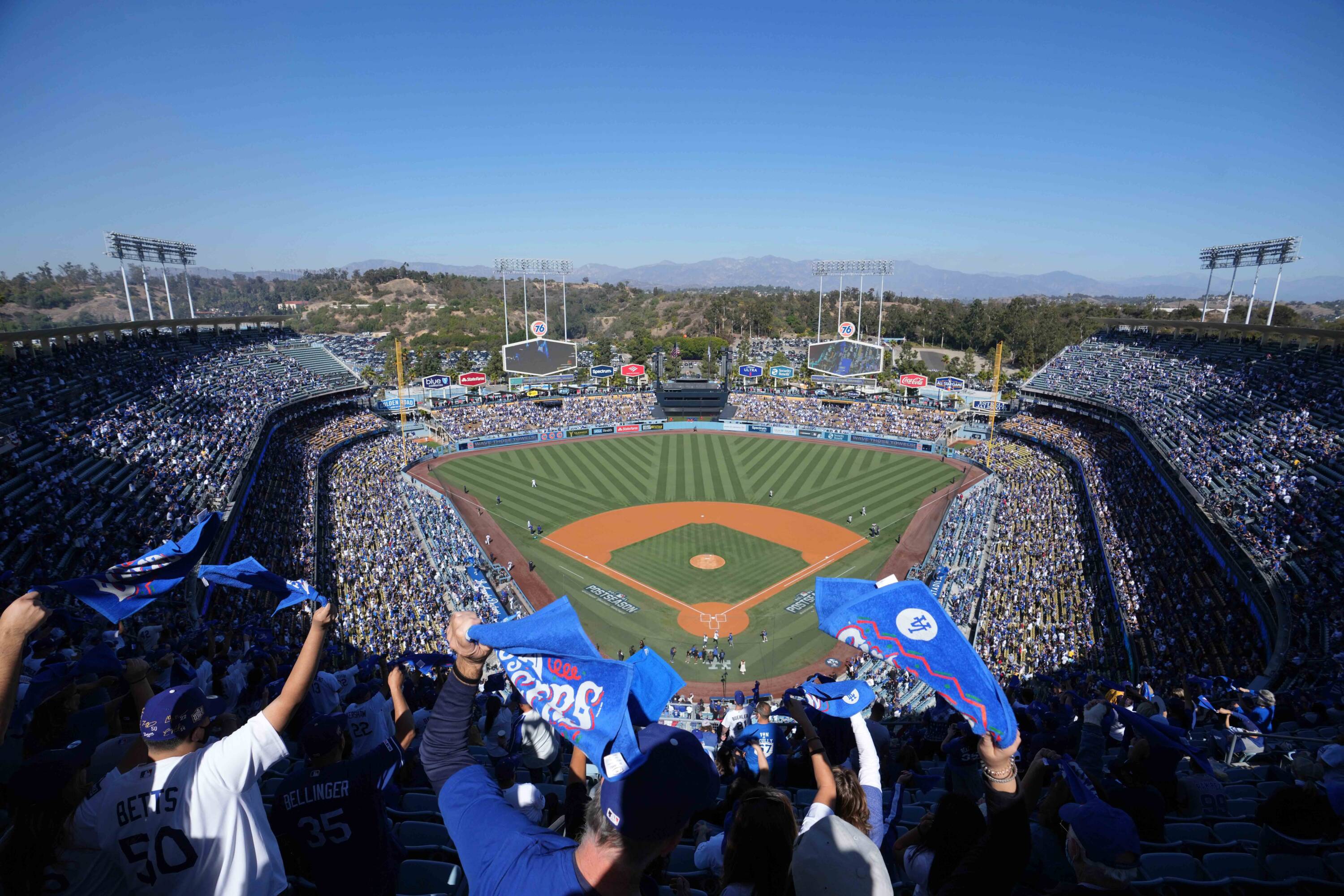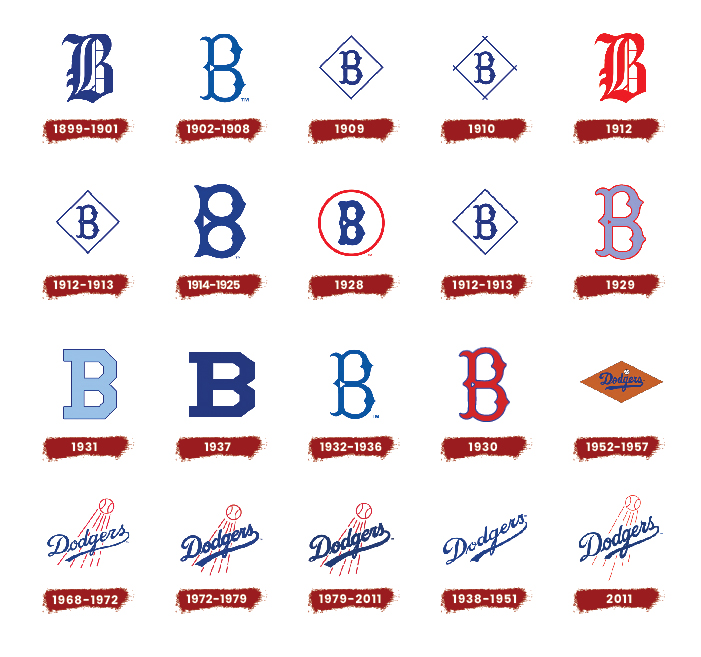Unveiling The Dodgers' Story: From Brooklyn Beginnings To LA Glory!
How has a team managed to captivate the hearts of millions across generations, evolving from humble beginnings to a symbol of sporting excellence? The Los Angeles Dodgers' saga is a testament to this, a story woven with threads of triumph, adversity, and an unwavering connection with its fans.
Born in the late 19th century, the Dodgers have undergone a multitude of transformations, not just on the field but also in the very fabric of their existence. Their storied journey is punctuated by legendary figures, unforgettable moments etched in the collective memory, and a rich cultural legacy that continues to inspire new generations. This exploration delves into the Dodgers' origins, their historic relocation, and the pivotal milestones that have shaped their identity, offering an insight into the very soul of this iconic franchise.
| Key Aspect | Details |
|---|---|
| Team Name and Nickname | Los Angeles Dodgers, "Dodgers" (originated from fans "dodging" trolley cars in Brooklyn) |
| Founded | Brooklyn Atlantics (1883) |
| Major League Entry | National League (1890) |
| Relocation | From Brooklyn, New York to Los Angeles, California (1957) |
| Home Stadium | Dodger Stadium (Los Angeles) |
| World Series Championships | 6 (1955, 1959, 1963, 1965, 1981, 1988) |
| Notable Players | Jackie Robinson, Sandy Koufax, Kirk Gibson |
| Notable Managers | Tommy Lasorda |
| Rivalries | San Francisco Giants, New York Yankees |
| Current Ownership | Guggenheim Baseball Management |
For further in-depth information, you can explore official sources such as MLB.com/Dodgers
- Hdhub4u Rest Your Guide To Free Hd Movies Tv Shows Year
- Discover Mexi Cuban Bio A Fusion Of Flavors Culture
The story of the Dodgers unfolds in Brooklyn, New York, where the team first took shape as the Brooklyn Atlantics in 1883. Initially a part of the American Association, their journey truly began in the National League in 1890, marking the beginning of a storied chapter in Major League Baseball history. During this formative era, the team experimented with different names, including the Brooklyn Grays, Bridegrooms, Superbas, and Robins, before embracing the moniker "Dodgers" in the early 20th century.
The "Dodgers" nickname itself is a fascinating piece of baseball folklore. It was derived from the team's early supporters, known for their agility in navigating the bustling streets of Brooklyn, and specifically for their ability to "dodge" the city's ubiquitous trolley cars. This nickname not only stuck but also came to represent the team's identity, symbolizing a certain resilience and adaptability, both on and off the field. Though these early years were characterized by competitive play, sustained success proved elusive.
In 1957, the Dodgers made a watershed decision, relocating from Brooklyn to Los Angeles. This move, masterminded by the visionary owner Walter O'Malley, signaled a critical turning point in the franchise's history. Driven by the desire to broaden the team's reach and capitalize on the burgeoning population and economic opportunities in California, the relocation was met with mixed emotions. While Brooklyn fans mourned the loss of their beloved team, the move opened new doors and possibilities for the franchise's future.
- Leah Cooper Inside Bradley Coopers Family Life Daughters Age
- Unveiling Patricia Booker The Trailblazers Journey Impact Business Insights
Upon their arrival in Los Angeles, the Dodgers rapidly established themselves as a dominant force in the Western United States. Playing in the newly constructed Dodger Stadium, they attracted vast crowds and quickly became a cornerstone of the city's sports culture. This strategic relocation not only transformed the Dodgers' fortunes but also significantly reshaped the landscape of professional baseball across America, introducing a new era of west-coast dominance and influencing the growth of the sport.
The Dodgers' history is enriched by a tapestry of legendary players and managers who have left an indelible mark on the franchise. Among the most celebrated is Jackie Robinson. His courageous breaking of the color barrier in Major League Baseball in 1947 was a landmark event, as he became the first African American player to join the league. Robinson's groundbreaking achievement paved the way for greater diversity and inclusion, solidifying his legacy as one of the most influential figures in baseball's history. His impact went far beyond the field, serving as a powerful symbol of social progress.
Another iconic figure in Dodgers history is Sandy Koufax. Known for his exceptional pitching prowess, Koufax dominated the game during the 1960s, earning his place in the Hall of Fame. His dominant performances were not just statistics; they were moments of pure artistry on the mound, captivating fans with his precision and unwavering command. Then there is Kirk Gibson whose unforgettable walk-off home run in the 1988 World Series remains a defining moment in the franchise's history, forever etched in the memories of fans. Managers such as Tommy Lasorda, with his charismatic leadership and strategic brilliance, further contributed to the team's success and enduring appeal. Lasorda, a master motivator and tactician, guided the Dodgers through various eras, leaving a legacy of both championships and a deep connection with the fans.
Throughout their history, the Dodgers have amassed numerous championships and achieved milestones that highlight their sustained excellence in Major League Baseball. The team has secured 24 National League pennants and six World Series titles, with notable victories occurring in 1955, 1959, 1963, 1965, 1981, and 1988. Each championship victory is a testament to the team's unwavering commitment, hard work, and teamwork, showcasing their ability to perform at the highest level under pressure. These triumphs have become defining moments, forever celebrated by fans.
Beyond their on-field achievements, the Dodgers have established records and traditions that have become integral to their identity. For example, the annual "Vin Scully Day" honors the legendary broadcaster's contributions to the franchise. Scully's voice became synonymous with Dodgers baseball, his storytelling weaving narratives that resonated with generations of fans. The "Dodger Dogs" have become a beloved staple at games, symbolizing the team's connection to its fans. The simple pleasure of enjoying a hot dog while watching the game is a tradition that connects the franchise with its fanbase on a personal level, creating a sense of community and belonging.
The impact of the Dodgers extends far beyond the baseball diamond. They've significantly influenced American culture and society. As one of the first teams to embrace diversity, the Dodgers played a pivotal role in breaking down racial barriers and promoting inclusivity in sports. This commitment to equality and social justice has garnered the franchise widespread respect and admiration, establishing the Dodgers as pioneers of progress.
Moreover, the Dodgers have become synonymous with Los Angeles, representing the city's vibrant spirit and dynamic energy. Through community outreach programs and charitable initiatives, the team has strengthened its ties with fans and contributed positively to the local community. The cultural impact is evident in their enduring popularity and the unwavering loyalty of their fanbase. The Dodgers are more than just a sports team; they are an integral part of the Los Angeles experience, providing entertainment and fostering community pride.
No exploration of the Dodgers' history is complete without acknowledging the passionate fan base that has supported the team through both triumph and adversity. From the streets of Brooklyn to the stands of Dodger Stadium, fans have played a crucial role in shaping the franchise's identity and success. Their unwavering loyalty and enthusiasm create an electric atmosphere at games, making Dodger Stadium one of the most exciting venues in sports. The fans are not merely spectators; they are an integral part of the team's fabric.
Modern technology has further strengthened the bond between the team and its fans. Social media platforms, streaming services, and interactive experiences allow fans worldwide to connect with the team in real time. This digital transformation has expanded the Dodgers' reach, enabling fans across the globe to share in the excitement and camaraderie that defines the team's spirit, extending the sense of community beyond geographical boundaries.
In recent years, the Dodgers have continued to evolve, embracing innovation and strategic planning to maintain their competitive edge. Under the leadership of the Guggenheim Baseball Management group, the team has invested heavily in player development, data analytics, and infrastructure, ensuring long-term sustainability and success. These efforts have paid off, with the Dodgers consistently contending for championships and setting attendance records. Their commitment to staying ahead of the curve in the ever-evolving world of baseball is a testament to their ambition.
The modern era of the Dodgers is characterized by a careful balance of tradition and progress, honoring the team's rich history while embracing the future. This approach has resonated with fans, securing the franchise's place as a leader in the world of professional sports. The Dodgers have proven that a commitment to excellence, a deep respect for the past, and a vision for the future can coexist and thrive, ensuring that their legacy continues to inspire.
The Dodgers' story is inextricably linked to the evolution of their home venues, from the intimate Ebbets Field in Brooklyn to the modern Dodger Stadium in Los Angeles. Each stadium has played a unique role in shaping the team's identity and enhancing the fan experience. Ebbets Field, with its close-knit atmosphere and storied past, remains a cherished memory for Brooklyn fans, while Dodger Stadium, with its expansive seating and panoramic views, offers a modern setting for baseball enthusiasts.
Over the years, the Dodgers have continually invested in upgrading their facilities to meet the expectations of contemporary sports fans. These improvements include enhanced seating options, premium amenities, and cutting-edge technology, ensuring that Dodger Stadium remains a premier destination for baseball fans. The Dodgers' commitment to improving the fan experience underlines their dedication to providing the best possible environment for those who support the team.
The Dodgers' rich history is further enhanced by iconic rivalries that have produced some of baseball's most memorable moments. The Dodgers' longstanding feud with the San Francisco Giants, known as the "Battle of California," is one of the most intense rivalries in sports, marked by fierce competition and dramatic confrontations. Similarly, the team's historical battles with the New York Yankees in the World Series have created legendary showdowns that continue to captivate fans. These games are not just contests; they are historical chapters in a long-running saga.
These rivalries not only elevate the level of play but also foster a sense of camaraderie among fans, who rally behind their teams with unwavering support. The passion and intensity of these matchups underscore the Dodgers' prominence in the baseball world, adding to the overall excitement and drama of the sport.
As the Dodgers look towards the future, they remain committed to building on their legacy of excellence. Investing in player development, embracing cutting-edge technology, and fostering community engagement remain paramount. The franchise aims to maintain its position as a leader in Major League Baseball. Their focus on sustainability and innovation guarantees that the team will continue to thrive in an ever-evolving sports landscape.
With a strong foundation rooted in tradition and a clear vision for the future, the Dodgers are well-positioned to achieve continued success and inspire new generations of fans. As the team embarks on this exciting journey, the history of Dodgers will undoubtedly play a vital role in shaping its destiny, demonstrating the enduring power of a team that has become a beloved cultural institution.
- Discover The Rise Of Jesus Lechuga Entertainment Icon
- Kathleen Rosemary Triado The Rising Star Of Entertainment

Dodgers 2020 Wallpapers Wallpaper Cave

Best Win Streaks in LA Dodgers’ History Dodgers Nation

La Dodgers Logo History Evolution of an Iconic Emblem Crevise